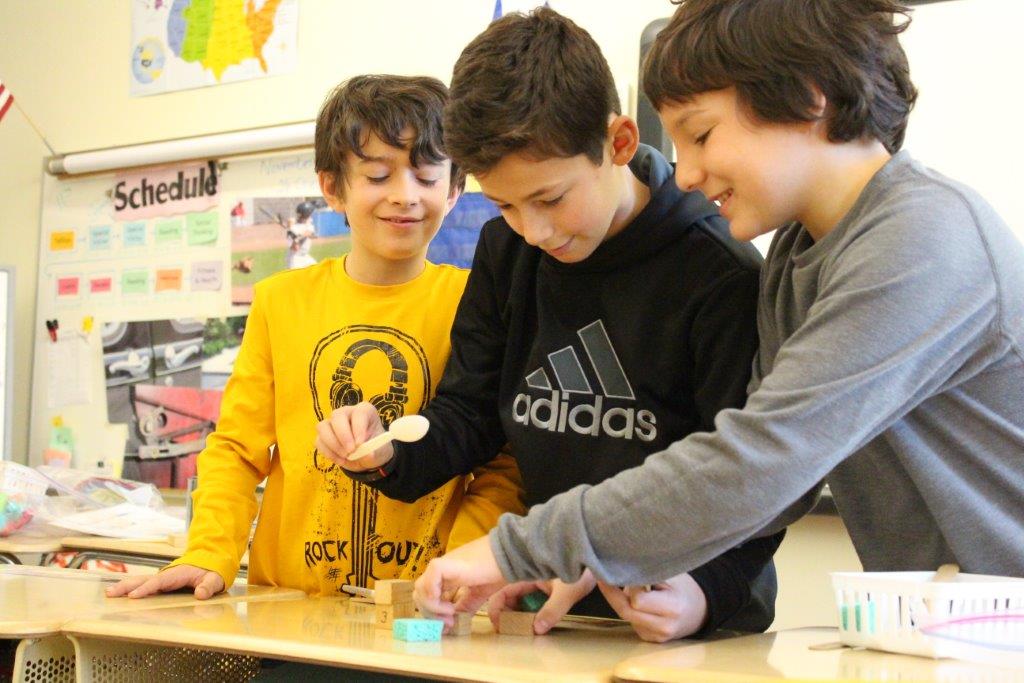
My name is Cindy Janower. I am the parent of two Rashi graduates and a Rashi fifth grader.
First of all, the faculty is committed and energized – you feel it in the hallways. Rashi has probably the best staff culture I’ve seen in any workplace – our faculty love to teach, they are passionate about the school’s mission, they love to work with their colleagues, and they are professionals who deeply respect each and every child. I learned long ago that a school with happy adults is a school with happy, developing children. And I’ve seen that now with all three of my kids, two of whom graduated to excel in high school and the third now in 6th grade. The kids feel supported, cared for, and known; and in that kind of environment, they can really take risks, burnish their emerging identities, and find their voices.
Secondly, everything the staff does at Rashi is aimed at enhancing teaching and learning with a thoughtful eye toward what they want our graduates to know and be able to do. The school’s goals are laid out in a curriculum map that is systematically revisited. Rashi’s approach to curriculum development is thoughtful, benchmarked and generative. The commitment to growth and forward progress is hard-wired into the culture, mirroring Judaism’s insistence that we annually reevaluate ourselves at Rosh Hashana and at life’s key moments. There’s a recognition that when we don’t continually reassess and progress, we stagnate spiritually. They same is true for institutions. At Rashi, the staff is committed to setting high standards and growing to reach them. It’s exciting to witness that constant, thoughtful and creative evolution the classroom – in the curriculum, the school’s use of technology, the staff’s evolving understanding of how to differentiate instruction for individual children, and the faculty’s ability to mentor each other. Our children have been the beneficiaries of that kind of innovation but I also think they’re drinking it all in – learning to be willing to experiment and get out of their comfort zones because of the way it’s been modeled by the adults in the building. Our eldest, for example, is a senior at Noble and Greenough, where she has excelled and for which she was very well prepared. But what impressed us most was her commitment to challenge herself by sticking with the classes she found most difficult. She visited her teachers, she integrated feedback, and she fought to do well. Her teachers there have been really impressed with her commitment. I’m not sure there’s anything more important to role model to kids than the discipline of having a growth mindset.
 Moreover, Rashi’s curricular goals go beyond what they want our kids to know and be able to do; they’re also aimed at who we want our graduates to be – young men and women of character. Confident. Questioning. Thoughtful. Caring. Knowledgeable and grounded in our 3,500-year heritage. Steeped in visions of justice. That matters to me. Indeed, AJ and I believe that our most important task as parents is to shape our children’s characters. This is our chance to build the foundation of who our children will become as individuals – how they will live in the world, as doers and as learners. And we don’t feel that we can do that alone – it’s simply too important, especially since kids are exposed younger and younger to a broad array of influences through the media – they need lenses and frameworks with which to interpret and filter all those influences. Indeed, our children spend more time with their teachers and their peers than they do with us. Rashi partners with us by breathing life into the values we want transmitted to our children. The school understands that education is about the reading, writing, and arithmetic and it excels at teaching each of those subjects – but it also uniquely understands that school is about more than that – it’s about building character –and to a person, our faculty is passionate about that goal. I can tell you that my 12 year old, Ali, wrote a big sign at the age of 6 that said “The World is a Person, it has feelings” and that my 14 year old happily gave up birthday gifts to collect videos for Children’s Hospital several years back. But I’m also struck by the fact that day to day they make decisions that are menschy – one gave up an afternoon, despite a substantial homework load, to spend time with a friend who just found out she had celiac disease; one got her entire grade to cheer for the child who seemed to struggle more than most to be encouraging and supportive at their class retreat last year; each of them have, at various times, defended a sister against us, her parents, when they think we’re out of line. They have some self-awareness about right and wrong – themselves and others. They’re obviously not the only kids who have that self-awareness, but I’m glad to know the school partnered with us to impart that sense of being intentional, compassionate, and acting with integrity.
Moreover, Rashi’s curricular goals go beyond what they want our kids to know and be able to do; they’re also aimed at who we want our graduates to be – young men and women of character. Confident. Questioning. Thoughtful. Caring. Knowledgeable and grounded in our 3,500-year heritage. Steeped in visions of justice. That matters to me. Indeed, AJ and I believe that our most important task as parents is to shape our children’s characters. This is our chance to build the foundation of who our children will become as individuals – how they will live in the world, as doers and as learners. And we don’t feel that we can do that alone – it’s simply too important, especially since kids are exposed younger and younger to a broad array of influences through the media – they need lenses and frameworks with which to interpret and filter all those influences. Indeed, our children spend more time with their teachers and their peers than they do with us. Rashi partners with us by breathing life into the values we want transmitted to our children. The school understands that education is about the reading, writing, and arithmetic and it excels at teaching each of those subjects – but it also uniquely understands that school is about more than that – it’s about building character –and to a person, our faculty is passionate about that goal. I can tell you that my 12 year old, Ali, wrote a big sign at the age of 6 that said “The World is a Person, it has feelings” and that my 14 year old happily gave up birthday gifts to collect videos for Children’s Hospital several years back. But I’m also struck by the fact that day to day they make decisions that are menschy – one gave up an afternoon, despite a substantial homework load, to spend time with a friend who just found out she had celiac disease; one got her entire grade to cheer for the child who seemed to struggle more than most to be encouraging and supportive at their class retreat last year; each of them have, at various times, defended a sister against us, her parents, when they think we’re out of line. They have some self-awareness about right and wrong – themselves and others. They’re obviously not the only kids who have that self-awareness, but I’m glad to know the school partnered with us to impart that sense of being intentional, compassionate, and acting with integrity.
I think there are enormous advantages to learning in a Jewish school. Our educational culture has produced some of the greatest minds in history; individuals who were not just knowledgeable in their fields but iconoclasts, willing to challenge the status quo and think differently. I don’t think that’s an accident. I think it comes from learning countless stories of our ancestors succeeding against all odds. It’s a very powerful set of stories to be steeped in at a young age. Rashi takes this one step further by giving students real, current examples of Tzedakah heroes who’ve made a big difference in the world. Those stories impart courage and inspire a measure of audacity. I also think it comes from an age-old educational discipline that encourages robust peer debate and acknowledges the multiple lenses with which to view each phrase, each word -sometimes even individual letters in the Torah. That teaches students that even a document with so much authority isn’t dogma – it invites one to question, to interpret, to wrestle with the content. I think that imparts an imperative to engage actively, to expect different perspectives on any issue, and to never understand simple pronouncements as dogma. Students learn that they have a responsibility to think through different perspectives and to make their own decisions; peer pressure and status quo are a fact of life, but they are never an excuse. We have the freedom, but also the responsibility, to think and to decide.
And if I can make one final point, I’ve found that Rashi encourages kids’ voices. You hear them in the hallways – it is not the quietest school you’ll visit. Students’ opinions are solicited – even on such weighty questions like “do you think God should have acted differently?” You’ll see a lot of camaraderie between student and teacher; and also serious challenge. My 9th grader told her math teacher at the beginning of her 7th grade year that she was having a hard time with her teaching style. And they talked about it. Her teacher took her seriously and they both made some changes to make sure the learning environment worked for both of them. That’s amazing. You’ll also see it in the social justice curriculum which, by expressing a belief that individuals, even kids, can make a difference, helps them to realize their power. And, again, you’ll see that our graduates disproportionately become leaders in their next environments and that they are very comfortable talking to adults; high schools always say that Rashi graduates are creative and “they know how to advocate for themselves”. When our oldest was interviewing at high schools, my husband used to try to make conversation with the kids in the waiting room and we realized that most teenagers look at their feet and grunt a lot. High school admissions people will agree with that. One told us that her job was to torture 13 year olds by trying to draw out more than two-word answers. But she pointed out that Rashi students were consistently different than that. They knew themselves, they were confident, and they were very comfortable talking to adults.
So I guess I’d want you to walk away with three points: the school will both exemplify and teach a growth mindset; it will give your kids a grounding in our values and help them become people of character; it; and it will encourage kids’ creative, strong voices. Personally, in addition to having my children master reading, writing, and arithmetic, those are the things I want them to take away from lower and middle school – character, a zeal for learning and resilience, creativity, self-directedness and the self-confidence to advocate and interface with others. Those emanate from Jewish values but they’re key 21st century skills.
Love what you read? Learn more about The Rashi School.

